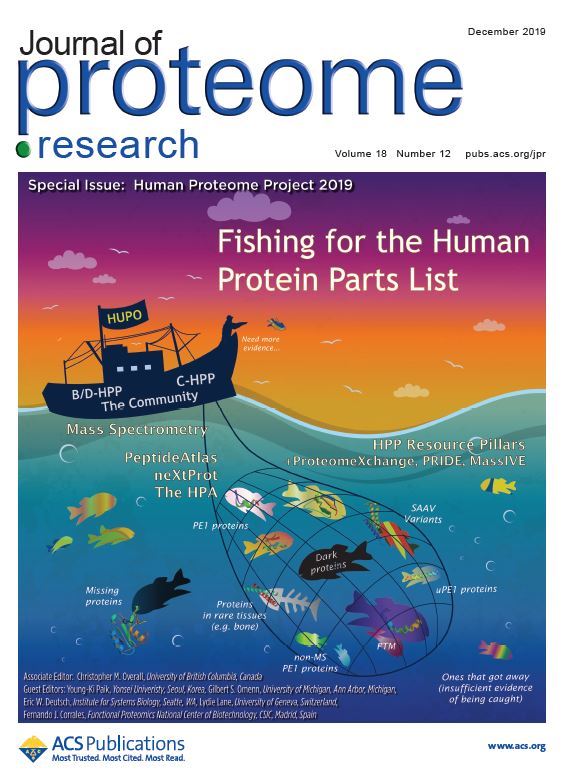
Chris Overall, University of British Columbia, Canada
 Publishing in the first week of December, the seventh annual special issue of the Journal of Proteome Research dedicated to the HPP has 20 major contributions from the two HPP initiatives, the Chromosome-centric HPP (C-HPP) and the Biology/Disease (B/D-HPP) HPP, and four Resource Pillars in Mass Spectrometry, Antibody-Profiling, Knowledgebase, and Pathology.
Publishing in the first week of December, the seventh annual special issue of the Journal of Proteome Research dedicated to the HPP has 20 major contributions from the two HPP initiatives, the Chromosome-centric HPP (C-HPP) and the Biology/Disease (B/D-HPP) HPP, and four Resource Pillars in Mass Spectrometry, Antibody-Profiling, Knowledgebase, and Pathology.
Based on the January 2019 updates of curation and annotation of the human proteome by neXtProt (https://www.nextprot.org/) from the standardized reanalysis of mass spectrometry datasets by PeptideAtlas (http://www.peptideatlas.org/), which form the baseline for the 2019 papers in this special issue, Omenn et al (2019) report that highly credible evidence supports Protein Evidence Level 1 (PE1) for 17,694 protein-coding genes, 89.3% of the total of 19,823 predicted human protein-coding genes. In this annual metrics of the human proteome paper, these numbers represent a net increase of 224 PE1 proteins, due to promotion of 213 PE2,3,4 entries to PE1, but with a net decrease of only 57 missing proteins (MPs) due to 60 PE1 demotions and 116 new PE2,3,4 entries.
Many strategies have been deployed to detect the neXtProt missing proteins: analysis of more diverse specimens including the first large scale proteome analysis of young adult human bone, use of much more sensitive mass spectrometry instruments, enrichment of low-abundance proteins, solubilization of membrane proteins, and the use of multiple proteases. This year’s Special Issue continues that endeavor.
Shteynberg et al 2019 have developed PTMProphet, open-source software for facilitating the calculation of confidence metrics for the precise localization of PTMs. Since its associated algorithms were integrated into the Trans-Proteomic Pipeline platform, this tool has been used to assess PTMs with different numbers of modifications and modified sites using the information content to yield correct localization for 1164 PTMs at less than a 1% false localization rate.
These are but a few highlights of the important compilation of papers highlighting the progress of the HPP.
Omenn, G. S.; Lane, L.; Overall, C. M.; Corrales, F. J.; Schwenk, J. M. et al., Progress on Identifying and Characterizing the Human Proteome: 2019 Metrics from the HUPO Human Proteome Project. J Proteome Res 2019.
Deutsch, E. W.; Lane, L.; Overall, C. M.; Bandeira, N.; Baker, M. S. et al. Human Proteome Project Mass Spectrometry Data Interpretation Guidelines 3.0. J Proteome Res 2019.
Shteynberg, D. D.; Deutsch, E. W.; Campbell, D. S.; Hoopmann, M. R.; Kusebauch, U. et al., PTMProphet: Fast and Accurate Mass Modification Localization for the Trans-Proteomic Pipeline. J Proteome Res 2019.
The new HPP Data Guidelines v 3.0
A key paper that needs close attention in the hunt for missing proteins is from Deutsch and colleagues 2019 who now report the HPP Guidelines v3.0, based on wide consultations with the HPP community over the past year. Key features of v3.0 are a reorganized main checklist, addition of guidelines for data-independent acquisition workflows and for use of the Universal Spectrum Identifier developed by the HUPO Proteomics Standards Initiative (PSI), an updated HPP pipeline for standardized reanalysis of MS datasets generated throughout the community, and a plan for incorporating MassIVE-KB into the HPP pipeline. This timely update maintains the high quality of MS-based data, which is essential for creating a credible chromosome-centric protein parts list for the entire human proteome.
The C-HPP Wiki
The C-HPP wiki is continually being updated and we require your input for the individual chromosome teams. Each chromosome group can upload themselves or send their neXt-MP50, neXt-CP50 progress and other updates for their chromosome to Peter Horvatovich (see C-HPP Wiki).
Chris Overall (chair), Young-Ki Paik (co-chair), Lydie Lane (co-chair), Gilberto B. Domont (MAL), Fernando Corrales (MAL), Pengyuan Yang (MAL) and Peter Horvatovich (secretary general).


.png)